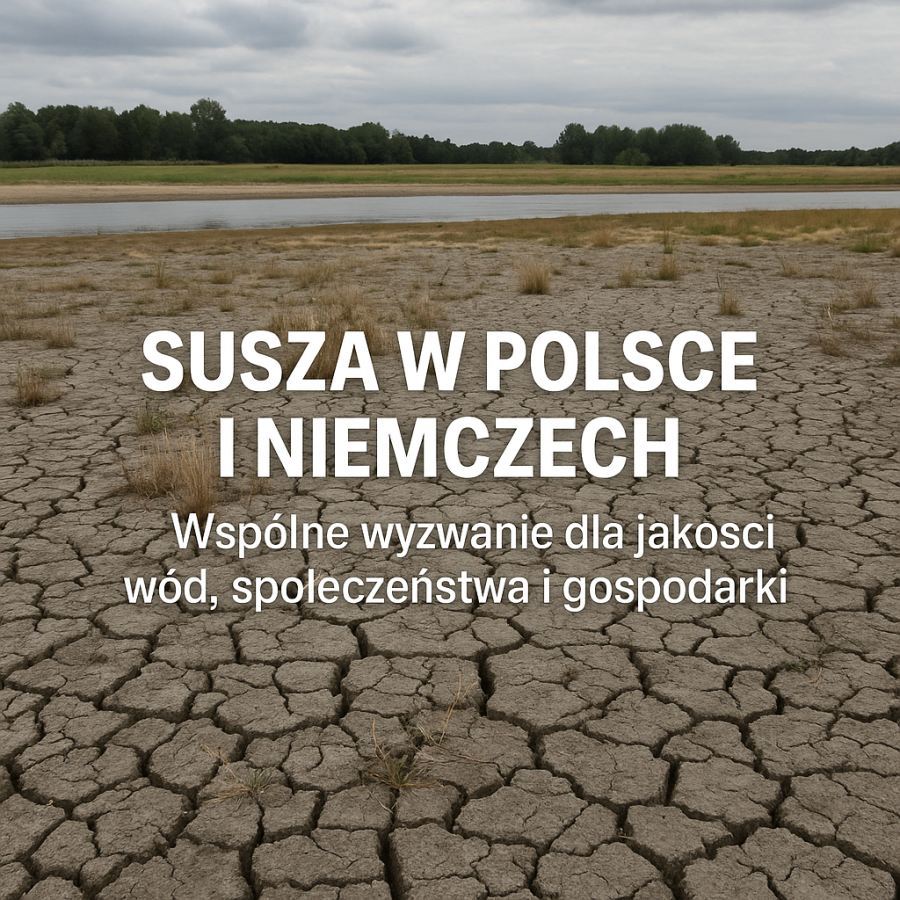Groundwater is not replenishing due to drought
In recent years, both Poland and Germany have been increasingly affected by severe droughts, which directly impact access to groundwater in the regions most exposed to water shortages. In Poland, the situation is becoming increasingly critical, particularly due to the disruption of the hydrological cycle and milder, drier winters.
Prolonged drought has caused groundwater levels to drop to dangerously low levels, with serious consequences for agriculture, industry, and daily life. The issue is particularly severe in regions that rely heavily on groundwater, such as southern and parts of eastern Poland. These areas are experiencing shortages of drinking water and irrigation water, leading to lower crop yields and rising food prices.
Germany faces a similar situation. Despite having more abundant water resources, the country is also grappling with a water crisis. Major rivers like the Rhine, Elbe, and Weser are seeing significantly reduced water levels, which affects not only agriculture but also inland water transport - an essential part of the German economy.
"This is a clear signal to the Polish Ministry of Infrastructure and government plans to develop inland navigation on the Oder River - the time for such solutions has passed.” - says Kuba Gogolewski, project coordinator at the Foundation “Development YES – Open-Pit Mines NO.” - "The climate window of opportunity has already closed. Fortunately, thanks to persistent public protests, Poland avoided shale gas extraction and the construction of new lignite mines, which would have only worsened the current problems. Unfortunately, spatial planning and most sectoral policies still fail to account for the fundamental changes in the hydrological cycle, year-round water availability, or rising water temperatures. We continue to treat water as an afterthought, instead of a strategic resource vital to the economy, while fossil fuels and metals are still idolized.”
Lignite mining and its impact on groundwater
Open-pit mining, especially of lignite, has a significant local impact on groundwater. As of late 2024, Poland had 7,332 open-pit mines, with just five of them extracting lignite. Among these is the controversial Turów mine, which has long been a source of conflict among residents, environmental groups, and neighboring countries like the Czech Republic and Germany. The mine’s impact on Czech groundwater was at the heart of an international legal dispute that culminated in a 2021 ruling by the Court of Justice of the EU and a subsequent Polish-Czech agreement.
However, groundwater issues in Poland’s Zgorzelec region rarely get as much attention as local budget revenues from the mine, the region’s economic future, or the fate of workers employed in the Turów mining and power complex. The Turów operation continuously pumps out groundwater to keep the mine safe for workers and equipment - an activity that has drastically lowered local groundwater levels. For groundwater body no. 105, the registered water extraction exceeds available resources by 183%. Polish authorities and the International Commission for the Protection of the Oder Against Pollution were notified of this situation as early as 2020. Local communities have relied on depleted water reserves, and rebuilding them will take years of effort and substantial investment.
Germany faces similar problems, particularly in areas with larger lignite deposits like Lausitz (partly on the Polish border) and the Rhineland. Intensive lignite mining in these regions has led to significant declines in groundwater levels and changes in groundwater flow, with major consequences for local water availability. Although Germany has launched post-mining land restoration efforts, these are costly and take many years to yield visible results.
While Germany has taken steps to cut CO2 emissions and gradually phase out lignite, the benefits of these policies will only be felt in the long term. A key question remains: to what extent do decisions to continue lignite extraction risk perpetuating water crises - particularly in areas historically dependent on groundwater, including those in Poland?
Systemic action is needed
Water management is now one of the most urgent environmental challenges facing both Poland and Germany. Climate change is intensifying the severity and frequency of droughts, while the pace of groundwater replenishment is becoming increasingly uncertain. Protecting water resources must become a top priority, not only locally but also through cross-border cooperation - especially between Poland and Germany, who share several water systems.
To address the situation, both countries must take bold steps to reduce the water-related impacts of lignite mining. This includes a decisive shift toward renewable energy, which would help lower greenhouse gas emissions and slow the degradation of natural resources. Key actions also include restoring post-mining landscapes, scaling down industrial activity in mining regions, investing in innovative water technologies, and recognizing water as a strategic asset for both the economy and society.
Improving water retention is also essential. This can be achieved by restoring wetlands, protecting forests, and implementing modern stormwater management systems. Each of these steps brings us closer to sustainable development and helps reduce the risk of future drought - and water-related crises - for people, nature, and the economy alike.
